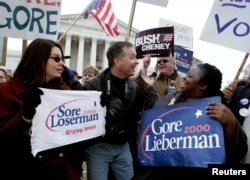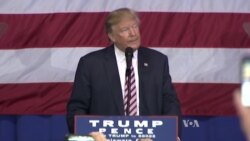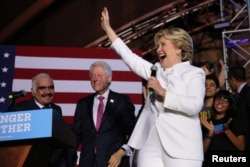U.S. political analysts say Republican Donald Trump's assertion that next month's presidential election is rigged, and that he might not accept the outcome if he loses, is unprecedented in the country's long electoral history.
Trump debated Democrat Hillary Clinton for 90 minutes late Wednesday on a host of issues, trading taunts and policy stances in their third and final face-to-face encounter. But when asked whether he would accept the result of the November 8 election, win or lose, Trump wavered, stunning many by declaring: "What I'm saying is that I will tell you at the time. I'll keep you in suspense, OK?"
Clinton called his remarks "horrifying," adding, "You know, every time Donald thinks things are not going in his direction, he claims whatever it is is rigged against him."
In 240 years of quadrennial presidential elections in the United States, occasional very close outcomes have been disputed, because of perceived voting irregularities or mistaken vote counts. But in every case, political analysts and historians noted, disputes have been resolved and there was a peaceful transfer of power to the next administration.
Closest vote in 2000
The 2000 election was perhaps the closest vote ever, with a ballot-by-ballot review in key areas in Florida and a court battle between the Democratic and Republican parties over details of the recount. The case went to the U.S. Supreme Court which, in a ruling 34 days after election day, decided the case in favor of George W. Bush, sending him to the White House as the 43rd U.S. president instead of former vice president Al Gore.
The Bush-Gore election divided the nation sharply, but both sides agreed to abide by the court's ruling, and the transfer of power was peaceful and cordial.
Watch video report from VOA's Jim Malone:
Never before this year, analysts say, has a major-party candidate like Trump claimed the election was rigged against him weeks before the actual vote. Although early voting is available in some of the 50 U.S. states, only a few million votes have been cast so far, out of an expected eventual total of more than 130 million votes.
By Thursday, Trump had modified his comment on the debate floor slightly, no longer declaring outright that he would challenge an unfavorable outcome. Instead, he said he reserved the right to contest voting irregularities that, in his view, might affect the election overall.
Stolen election 'preposterous'
"It's unprecedented that a candidate would say that he wouldn't accept the result," political scientist John Gilmour of the College of William & Mary in Virginia told VOA. There would be no reason for Trump to accept an election loss in the unlikely event of widespread vote fraud, the professor added, but that the candidate does not know now that there is any election fraud.
Gilmour said it is "preposterous" that the U.S. presidential election could be stolen, because it is decided through a decentralized system of state elections, rather than by the federal government in Washington. The vote totals in the states with the largest populations have the most influence on the overall outcome, not the national popular vote, under the U.S. system of electoral college voting.
James Gimpel, a political scientist at the University of Maryland, said the U.S. presidential elections "raise a question of loser's consent" in the outcome — "consenting to be governed by the winners, that the losers will go along with the result."
Gimpel said the debate comment by Trump, a real-estate mogul who has never before run for elected office, was "an admission he's likely to lose, a rationalization for the loss that does not place the blame where it belongs, on the inadequacies of his candidacy."
Strong lead for Clinton
Clinton, a former U.S. secretary of state looking to become the country's first female president, has surged in the last couple of weeks to more than a six-percentage-point advantage over Trump in national polls, and also moved ahead of him in closely contested battleground states that will determine the outcome. Polling analysts give her a 9-in-10 chance of becoming the country's 45th president, succeeding President Barack Obama when he leaves office in late January.
Trump's political fortunes have slumped in the aftermath of the disclosure two weeks ago of a 2005 tape in which he made lewd comments about women and boasted how he could grope them with impunity because he was a celebrity host of a television entertainment program. He apologized for his comments, dismissing his ribald tone as just "locker room talk" and declaring that he had not actually made unwanted advances on women.
Within days, however, nine women came forward to make public their accounts of Trump making unexpected and unwanted sexual advances on them that sounded much like what he had described in the 2005 tape. Trump has denied the claims.
'Trump will look like a sore loser'
Mark Major, a political scientist at Pennsylvania State University, said he thinks Trump's claim that the election is rigged, filled with phantom voters using the names of dead people, is "the result of sexism."
Trump feels, in effect, that "there's no way a woman could beat me, Donald Trump," Major said. "Not only is he going to lose, but he's going to lose to a woman. The only explanation is that the election is rigged."
University of Virginia political analyst Geoffrey Skelley said if Trump "loses — and there's no reason to think otherwise — he'll look like a sore loser."
Skelley noted that a recent national poll showed Republicans and Democrats alike believe the losing presidential contender should follow U.S. political tradition and concede to the winner.
Fraud risk close to zero
Edward Foley, an election law expert at the Ohio State University, said that in the U.S., "it's extraordinarily unlikely that any statewide election could be rigged ... to manipulate the results."
"And it's especially unlikely with respect to presidential elections," he continued, "because the way presidential elections work is that they are 50 different state elections. It's not just one big national election. The risk of this is exceedingly low, but it's not zero."
Americans, he said, should have a "very high degree of confidence" that the election will be carried out fairly. He said Trump's claim that the election is rigged is "way overstated, irresponsibly so."
Foley said there is "very strong evidence" that voter impersonation at balloting locations across the country is "minuscule." He suggested that a person is more likely to be struck by lightning than to encounter a voter trying to claim he is someone else to cast a fraudulent ballot.








